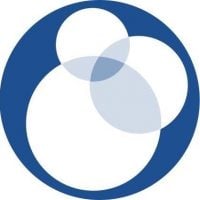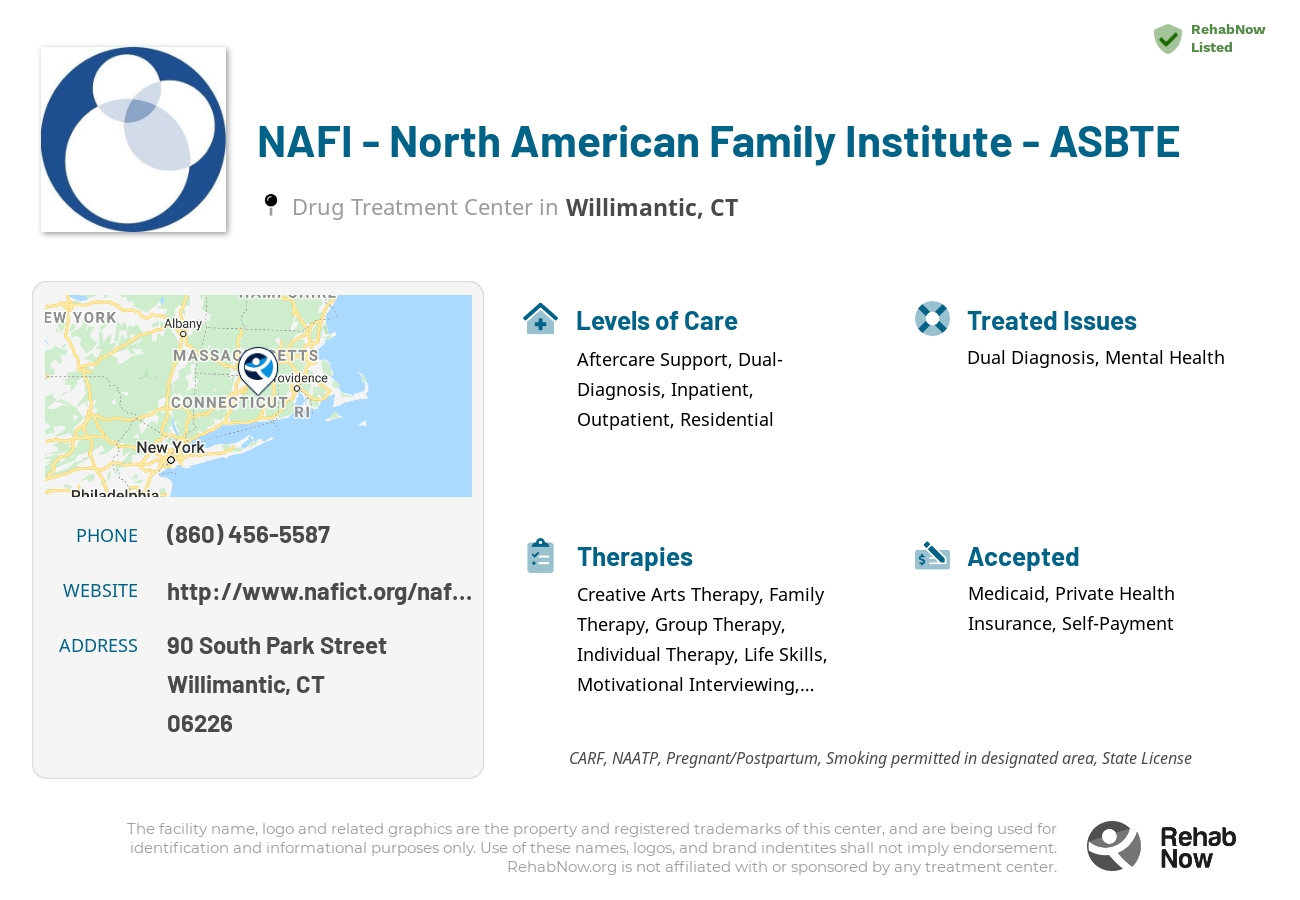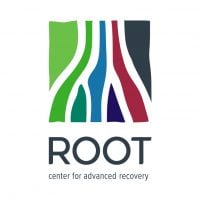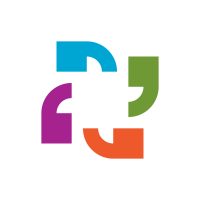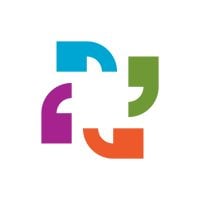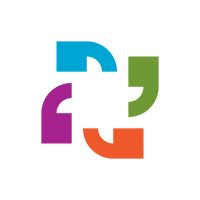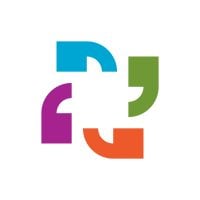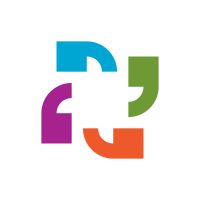NAFI - North American Family Institute - ASBTE
Drug Rehab Center in Willimantic, Connecticut
NAFI - North American Family Institute - ASBTE in Connecticut is an accredited addiction treatment facility that provides comprehensive individualized care, including evidence-based therapies, trauma-informed care, and holistic approaches, for individuals struggling with substance use disorders.
About NAFI - North American Family Institute - ASBTE in Connecticut
NAFI - North American Family Institute - ASBTE in Willimantic, Connecticut is an addiction treatment facility that provides comprehensive, individualized treatment for substance use disorders. NAFI is accredited by The Joint Commission and licensed by the Connecticut Department of Mental Health and Addiction Services. The facility offers a variety of services to help individuals find lasting freedom from addiction including medical detoxification, residential programs, and partial hospitalization programs. The staff at NAFI is comprised of professionals who are dedicated to providing compassionate, comprehensive care to those who are struggling with addiction.
NAFI - North American Family Institute - ASBTE offers a variety of services that can help individuals recover from addiction. These services include evidence-based therapies such as cognitive behavioral therapy, dialectical behavior therapy, motivational interviewing, relapse prevention, and medication-assisted treatment. The facility also provides trauma-informed care, life skills education, an aftercare program, and ongoing individual, family, and group counseling. Additionally, NAFI is committed to providing holistic care that focuses on the physical, emotional, and spiritual needs of each individual.
NAFI - North American Family Institute - ASBTE is dedicated to providing high-quality care and has earned several awards for its commitment to excellence in addiction treatment. The facility has been awarded the Healthgrades Patient Safety Excellence Award for the past two years and is also certified by the National Commission on Correctional Health Care. NAFI's programs are also accredited by the Commission on Accreditation of Rehabilitation Facilities (CARF). Additionally, NAFI offers a variety of programs that are specifically designed to meet the unique needs of the LGBTQ+ community.
Genders
Ages
Modality
Additional
Conditions and Issues Treated
Recovery is not simply about stopping drug use. Recovery is working with addiction while recovering mental health issues that are fueling the addiction in the first place.
Levels of Care Offered
This center offers a variety of custom treatment tailored to individual recovery. Currently available are Aftercare Support, Dual-Diagnosis, Inpatient, Outpatient, Residential, with additional therapies available as listed below.
Individuals who are suffering from severe addiction or have a high risk for dangerous health concerns are often recommended to receive inpatient treatment.
Choosing to enter an inpatient treatment program is beneficial for people who are suffering from severe addiction, or who have a high risk for dangerous health concerns.
Inpatient treatment is beneficial for:
- People who have a history of severe withdrawal.
- People who have attempted to overcome addiction on their own without success.
- People who have a history of relapse, or have recently relapsed.
- People at risk for drug overdose or withdrawal-related complications.
- People with medical conditions that are worsened by drug or alcohol use.
Outpatient treatment is considered the lower intensity level of addiction treatment. It’s ideal for early phase addiction or lower intensity addictions. It may include weekly sessions instead of daily. It may include weekly sessions instead of daily. Peer group support, 12-step programs, and individual counseling may still be involved but at a lesser frequency than an intensive outpatient program. It is a good choice for someone who doesn’t need to go through a medically supervised detox and who has a supportive home environment. It requires motivation and dedication to commit to the program without constant monitoring.
Residential treatment programs are those that offer housing and meals in addition to substance abuse treatment. Rehab facilities that offer residential treatment allow patients to focus solely on recovery, in an environment totally separate from their lives. Some rehab centers specialize in short-term residential treatment (a few days to a week or two), while others solely provide treatment on a long-term basis (several weeks to months). Some offer both, and tailor treatment to the patient’s individual requirements.
Aftercare support should take place after outpatient treatment has ended. There are a few different types of aftercare support that patients can seek. These include 12 Step, Self-help groups (AA, NA), Therapeutic communities, Long-term, structured sober living arrangements, and Halfway houses (residential treatment centers).
Therapies & Programs
Individual therapy involves one-on-one sessions between the patient and therapist. It provides patients with a safe environment to openly discuss personal and sensitive issues with the therapist. They find the therapist as someone they can trust. Individual therapy aims to identify the core issues that would have led the patient to substance abuse and address them effectively. The therapist can develop patient-specific customized solutions through individual therapy, which aids speedier recovery.
Family therapy is a group problem-solving that aims to improve communication and relationships between the addict, their family, and sometimes friends. The main goal of family therapy for drug addiction is to create an environment where communication can occur without judgment, hostility, or blame. The therapist is with the family as they learn to communicate differently, especially with the addict when s/he is using. The family can learn to reduce their enabling behavior or rally together and support each other during tough times.
An addict’s family can play a vital part in helping them to avoid relapse because they can spot the warning signs and help them get back on track before it becomes too much of a problem. Family therapy is one of the most effective ways to help addicts stay on the path to long-term sobriety. When a drug addict decides that they want to try and get sober, it takes the support of every person they love to succeed. It can be incredibly difficult for loved ones to watch an addict go through the pain and suffering of withdrawal, but by being there with them and supporting them, they can help to make sure that the addiction never returns.
Groups typically involve meetings with other recovering addicts who can relate to one another’s experiences. They might meet in person or online and typically focus on the process of staying sober rather than overcoming a specific addiction.
In these groups managed by NAFI - North American Family Institute - ASBTE, addicts can build a sense of community and develop strong emotional connections with others who understand what they are going through. These beneficial relationships can help addicts overcome their cravings and prevent relapse at any point during the recovery process.
In general, trauma therapy is a clinical process that helps individuals deal with mental stress often caused by traumatic events. The therapist helps the person identify, understand, and work through the problem. This is done with the help of talking about it in group or one-on-one counseling sessions. Therapists use relaxation, role-playing, art, and music to help the person open up about what is bothering them.
There are many different types of trauma therapists, such as psychiatric nurses and counselors. Not everyone is a good candidate for this type of therapy; it is generally reserved for people who have recently experienced a traumatic event and struggle to get over it. It is often done for children, teenage victims of sexual assault, and war veterans.
There is hope for people who are addicted to drugs and alcohol. Cognitive Behavioral Therapy (CBT) is the solution. CBT focuses on the underlying thoughts and behaviors that caused the addiction problem in the first place and may cause a relapse. This type of psychotherapy addresses negative feelings common in substance abuse disorders. It helps to change them by restructuring thought patterns. It’s about removing negative thoughts and providing long-term benefits while promoting self-awareness, self-control, and healthy ways to respond to negative thoughts. These sessions can be done by themselves or as part of combination therapy.
Since addiction is a chronic physical and mental illness, addicts need to learn as many life skills as possible. Many drug treatment centers offer life skills activities as part of their addiction recovery programs. Examples include cooking classes, employment training, resume writing seminars, parenting classes, and computer training. Life skills activities help addicts find employment, take care of their families, and give back to the community.
Payment Options Accepted
For specific insurance or payment methods please contact us.
Is your insurance accepted?
Ask an expert, call (888) 674-0062
NAFI Associated Centers
Discover treatment facilities under the same provider.
- NAFI - Child Youth & Family Support Center Willimantic in Willimantic, CT
- NAFI - Child Youth & Family Support Center Norwich in Norwich, CT
- NAFI - North American Family Institute Farmington in Farmington, CT
- NAFI - North American Family Institute - MST - TAY in New Haven, CT
- NAFI - North American Family Institute - Outpatient Clinic in Waterbury, CT
Learn More About NAFI Centers
Additional Details
Specifics, location, and helpful extra information.
Willimantic, Connecticut 6226 Phone Number(860) 456-5587 Meta DetailsUpdated November 25, 2023
Staff Verified
NAFI - North American Family Institute - ASBTE Patient Reviews
There are no reviews yet. Be the first one to write one.
Willimantic, Connecticut Addiction Information
Connecticut has a higher rate of substance abuse and addiction than the national average. The state ranks in the top 10 in the country for illicit drug dependence among those ages 18 to 25. In 2010, there were 9,211 people admitted to an alcohol treatment facility for alcohol abuse combined with a secondary drug. Connecticut ranked fifth in the United States of America for the number of fatalities involving drunk driving in 2014.
The drug addiction problem in Willimantic, Connecticut, is relatively severe. Out of 18,000 people, over 6,000 people in the Willimantic are addicted to drugs. The rates of addiction and abuse are high, and the problem is only getting worse. Drug addiction treatment in Willimantic, Connecticut, can vary depending on the facility, but typically, it will involve counseling, therapy, and medication.
Treatment in Nearby Cities
- Schenectady, CT (117.0 mi.)
- Torrington, CT (47.4 mi.)
- Bethel, CT (66.5 mi.)
- Plainfield, CT (15.4 mi.)
- Enfield, CT (26.7 mi.)
Centers near NAFI - North American Family Institute - ASBTE
The facility name, logo and brand are the property and registered trademarks of NAFI - North American Family Institute - ASBTE, and are being used for identification and informational purposes only. Use of these names, logos and brands shall not imply endorsement. RehabNow.org is not affiliated with or sponsored by NAFI - North American Family Institute - ASBTE.
